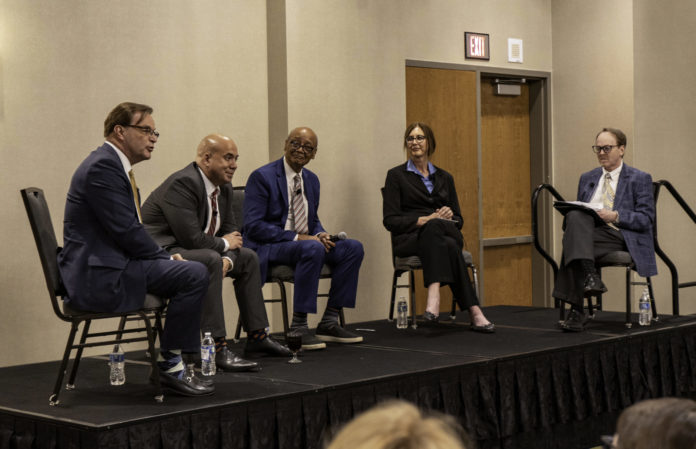
OVERLAND PARK — As she sat in the back of the conference room, behind rows and rows of people, she listened to this panel of four talk about Kansas classrooms. How long have the people on this panel spent in public schools, she wondered. More specifically, how long have they spent in Kansas ones?
This was the reality for Overland Park Democratic Sen. Cindy Holscher on June 13 as she sat through a panel held by the Kansas Policy Institute, a nonprofit organization that describes itself as “engaging citizens and policy makers with research and information to enact public policy solutions that protect the constitutional right to freedom of all Kansans, give them greater access to better educational opportunities, and allow them to keep more of what they earn.”
The event, “The Cultural Divide Between Parents and Schools,” broached topics such as critical race theory, gender identity and parents’ rights in Kansas public schools. However, some Kansans worried about KPI spreading misinformation.
The panel consisted of four speakers: Dave Trabert, CEO of KPI; Wilfred Reilly, author of “Hate Crime Hoax,” and associate professor of political science at Kentucky State University; Robert Woodson, author and president of the Woodson Center, a nonprofit that supports local initiatives to improve low-income communities; and Mary Miller, a private school advocate for Parents Defending Education, a nonprofit focused on “reclaiming schools from activists promoting harmful agendas.”
“When COVID (started) and with the George Floyd situation, schools had a hysterical knee-jerk reaction,” Miller said. “They changed policies, curriculum and brought in activists. Those three things can cause a lot of chaos in schools, (which) are really at a tipping point. Parents found out that the school system was out of balance.”
Holscher said there is no evidence to support the claim that Kansas schools brought in activists or made changes in curriculum.
“What activists are they talking about that have been brought into the area?” Holscher said. “A lot of things were thrown out there that I think would make parents go, ‘Oh my gosh,’ and kind of concern them. But again, if it’s not quantified, is it actually happening? Is it happening around here?”
The term “activist” is often misused by KPI, according to David Smith, spokesman for the Shawnee Mission School District.
“Look at Kansas Policy Institute,” Smith said. “They testify on literally every bill related to education funding that goes through the Statehouse. It’s hard to imagine anyone who’s more of an activist than them. That’s their right. They have certain beliefs, and they advocate on behalf of those beliefs, but to then label somebody who maybe brings a different perspective as an activist is being disingenuous.”
During the panel, Trabert provided two examples from Kansas schools that his organization claims are inappropriate. The rest of the examples were either from the west or east coasts.
“We found a video of the diversity director in Shawnee Mission,” Trabert said, “explaining why it’s really important for school systems to talk to kids about gender identity and transition to another gender as early as kindergarten.”
This example, however, was taken out of context, Smith said. Trabert was talking about a minute-and-a-half clip that originated from an hourlong meeting with the Parent-Teacher Association. Tyrone Bates Jr., coordinator of diversity, equity and inclusion at Shawnee Mission School District, spoke with parents about the importance of parent engagement and communication with teachers, according to Smith.
Children are curious and ask questions when new topics come up, Smith said.
“I’m saying an example of a child asking a question related to the gender of another child in the classroom, maybe because of the length of that child’s hair or something, (regardless), the question comes up,” Smith said. “Is this the time to have a conversation about gender identity? The teacher has to be able to address that. To not address it would be unfair to the child about which the question was asked.”
Discussions about LGBTQ+ topics in education, Miller said, only create confusion for young students.
“The policies that have been put in place in the last two years have been an abject failure,” Miller said. “It’s created more defensiveness, more gender confusion and more emotional distress amongst the students. We’ve had two years. The experiment has failed.”
However, efforts to be more inclusive in public schools have been going on for more than two years. In 2015, the number of Gay Straight Alliance clubs increased following the legalization of gay marriage.
Marcus Baltzell, spokesman for Kansas National Education Association, said it’s important for students to know that it’s educators’ responsibility to help them in any way they can.
“As far as gender identity goes, you know, we’re educators,” Baltzell said. “The point of being an educator is that we’re gonna save the world, one child at a time. We take whoever comes to our classroom, in whatever condition they come to our classroom, and we do everything we can to meet the needs of those students.”
During the question-and-answer portion of the panel, the audience was asked to write down questions on notecards. One person anonymously asked, “Doesn’t this mean not teaching kids about slavery or Jim Crow? That some people aren’t heterosexual? You’re turning a blind eye to America’s dissent.”
Reilly said the problem isn’t in teaching about U.S. history but rather that it’s being taught in a dishonest way.
“This argument, to me, is a variant of a common argument you hear on the political left, which is, ‘You oppose affirmative action, because you don’t like finally being treated equally,’ ” Reilly said. “And it’s an interesting spin on words. But the response is no, I don’t like affirmative action, because I don’t like being treated differently.”
Woodson, who is Black, called himself a “certified racial exorcist,” and told the primarily white audience he was absolving them of doing anything discriminatory. Many cheered in response.
Baltzell said that in the classroom, teachers are doing their best to teach without influence.
“We are all about teaching honestly,” he said. “We want to keep politicians out of the classroom, and teachers should be able to teach about the history of America, even the difficult spots. And certainly we have had a long history of difficulty when it comes to equality and civil rights in America.”
Noting that teachers and lesson information is already accessible, Baltzell said that legislation such as the “Parents’ Bill of Rights” only serves to complicate teachers’ jobs. A bill passed this session required that teachers file their lesson plans online, and if parents didn’t like a particular lesson, they could pull their child out of that class period. Gov. Laura Kelly vetoed the bill, and it didn’t become law.
“When you look a little closer,” Baltzell said, “what you see is making educators jump through hoops keeping them, quite honestly, from teaching.
“If we were to ask those same legislators who are behind these efforts if they would live by the same standards that they put in these bills, as legislators, we know that they would be against that,” he added. “If they had to post on some website every email, every conversation, every note that’s passed between them and their offices and their constituents, we know that they would be against that from the get-go.”








